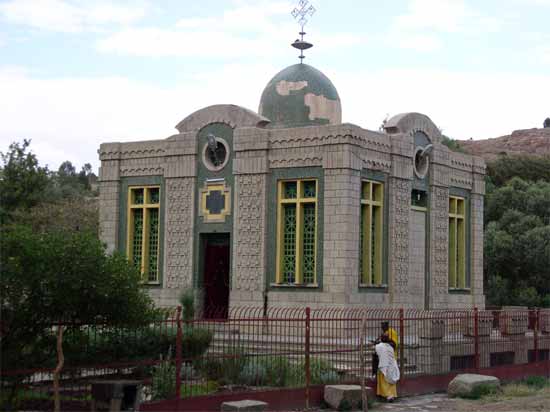
According to the 1994 National Census, Christians make up 61.6% of the country’s population, Muslims 32.8%, and practitioners of traditional faiths 5.6%. Christianity is the most widely practiced religion in Ethiopia, but there are contradictory figures, putting Islam as being about equal or a slight majority.
Orthodox Christianity has a dominant presence in central and northern Ethiopia, while both Orthodox & Protestant Christianity has large representations in the South and Western Ethiopia. A small ancient group of Jews, the Beta Israel, live in northwestern Ethiopia, though most have emigrated to Israel in the last decades of the twentieth century as part of the rescue missions undertaken by the Israeli government, Operation Moses and Operation Solomon. Some Israeli and Jewish scholars consider these Ethiopian Jews as the historical “Lost Tribe of Israel.”
Sometimes Christianity in Africa is thought of as a European import that arrived with colonialism, but this is not the case with Ethiopia. The Kingdom of Aksum was one of the first nations to officially adopt Christianity, when St. Frumentius of Tyre, called Fremnatos or Abba Selama (“Father of Peace”) in Ethiopia, converted King Ezana during the fourth century AD. Many believe that the Gospel had entered Ethiopia even earlier, with the royal official described as being baptized by Philip the Evangelist in chapter eight of the Acts of the Apostles. (Acts 8:26-39) Today, the Ethiopian Orthodox Tewahedo Church, part of Oriental Orthodoxy, is by far the largest denomination, though a number of Protestant (Pentay) churches and the Ethiopian Orthodox Tehadeso Church have recently gained ground. Since the eighteenth century there has existed a relatively small Uniate Ethiopian Catholic Church in full communion with Rome, with adherents making up less than 1% of the total population.
The name “Ethiopia” (Hebrew Kush) is mentioned in the Bible numerous times (thirty-seven times in the King James version). Abyssinia is also mentioned in the Qur’an and Hadith. While many Ethiopians claim that the Bible references of Kush apply to their own ancient civilization, pointing out that the Gihon river, a name for the Nile, is said to flow through the land, most non-Ethiopian scholars believe that the use of the term referred to the Kingdom of Kush in particular or Africa outside of Egypt in general. Some have argued[citation needed] that biblical Kush was a large part of land that included Northern Ethiopia, Eritrea and most of present day Sudan. The capital cities of biblical Kush were in Northern Sudan.
Islam in Ethiopia dates back to the founding of the religion; in 615, when a group of Muslims were counseled by Muhammad to escape persecution in Mecca and travel to Ethiopia, which was ruled by Ashama ibn Abjar, a pious Christian king. Moreover, Bilal, the first muezzin, the person chosen to call the faithful to prayer, and one of the foremost companions of Muhammad, was from Ethiopia.
There are numerous indigenous African religions in Ethiopia, mainly located in the far southwest and western borderlands. In general, most of the (largely members of the non-Chalcedonian Ethiopian Orthodox Tewahedo Church) Christians generally live in the highlands, while Muslims and adherents of traditional African religions tend to inhabit more lowland regions in the east and south of the country.
Ethiopia is also the spiritual homeland of the Rastafari movement, whose adherents believe Ethiopia is Zion. The Rastafari view Emperor Haile Selassie I as Jesus, the human incarnation of God, a view apparently not shared by Haile Selassie I himself, who was staunchly Ethiopian Orthodox Christian. The concept of Zion is also prevalent among Ethiopian Orthodox Christians, though it represents a separate and complex concept, referring figuratively to St. Mary, but also to Ethiopia as a bastion of Christianity surrounded by Muslims and other religions, much like Mount Zion in the Bible. It is also used to refer to Axum, the ancient capital and religious centre of Ethiopian Orthodox Christians, or to its primary church, called Church of Our Lady Mary of Zion. The Bahá’í Faith has been established in Ethiopia since the 1950s, and today is concentrated primarily in Addis Ababa, but also in the suburbs of Yeka, Kirkos and Nefas Silk Lafto.